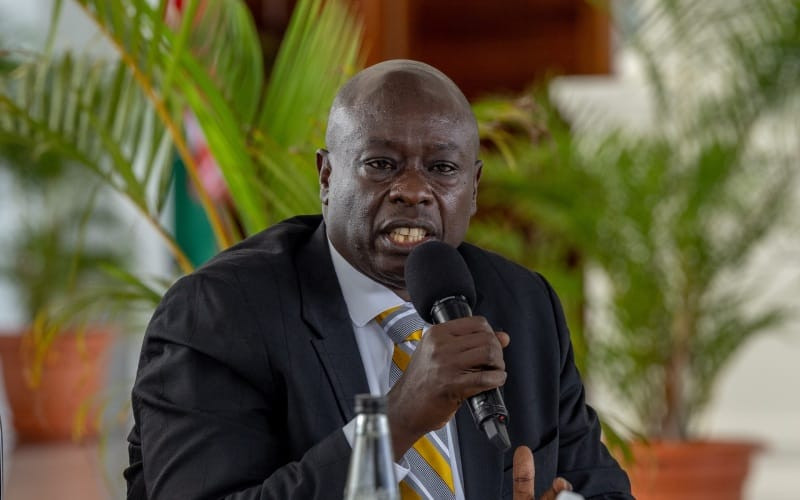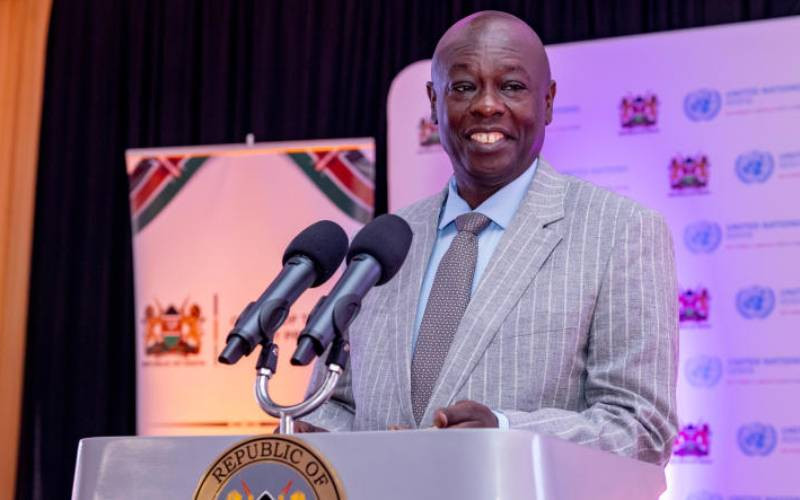
Deputy President Rigathi Gachagua’s war on alcoholism in central Kenya received a major boost after Nyandarua county passed a Bill to regulate the production, sale, distribution and consumption of alcoholic drinks.
The Nyandarua County Alcoholic Drinks Control Act, 2023, provides that any person producing, manufacturing and distributing alcoholic drinks in the county must make an application to the management committee and pay a fee where applicable.
At the same time, manufacturers, will also be required to obtain a license or certification from the Kenya Bureau of Standards (KEBS).
“Now we have a legal framework to support the eradication of toxic and deadly brew. Through the leadership of the county, you are saving and securing a generation that risks being wiped out by illicit alcohol,” said DP Gachagua.
The DP lauded the proposed law for complementing the efforts of the National Authority for the Campaign Against Alcohol and Drug Abuse (Nacada) and the security agencies in eradicating consumption of illicit brew.
“We appeal and encourage other counties particularly those working towards enacting similar frameworks to hasten the process,” he said.
Nyandarua leaders led by Governor Kiarie Badilisha presented to Gachagua the Nyandarua County Alcoholic Drinks Act, 2023 seeking to regulate the consumption and sale of alcohol in the county.
The Act recommends among other things; the introduction of a joint vetting committee between the county and the national government officers (the County Commissioner and the officers of the county government) in licensing of the bars and restaurants in the county.
According to the Act, all vehicles transporting the alcoholic drinks must be branded and operate between 8am to 6pm to avert cases of mischief.
While commending Nyandarua for being the first county in Mt Kenya region to approve the Bill, Gachagua said he was committed to the fight against alcoholism despite threats of losing his political career.
“I have been sold fear that the people who sell alcohol are actively involved in the politics of our region and that my engagements in the fight against alcohol abuse may put my career on the line," he said.
“If by enacting laws to protect the next generation, if by making sure that the law is applied strictly for the sake of protecting the next generation from extinction, if that will bring our career to an end, so be it. There is no need for any leader to lead a drunken nation. There is no pride for me to be the Deputy President while everybody where I go is staggering,” Gachagua said.
The DP admitted that the fight against drugs has not been bearing fruit due to lack of sufficient laws, a move he attributed to collision between the government, the Director of Public Prosecutions (DPP) and the Directorate of Criminal Investigations (DCI).
Stay informed. Subscribe to our newsletter
The new law stipulates that every sub-county will have an Alcoholic Drinks Regulation Committee which will vet applications for liquor sellers, subsequently filing a quarterly report to the County Alcoholic Drinks Regulation and Management Committee.
The law also bars anyone from producing, manufacturing and selling alcohol in the county without a valid licence, contrary to which offenders could be fined Ksh30,000 or jailed for a term not exceeding four months.
Supermarkets, retailers and restaurants will not be granted licences to sell alcohol. Licences will not also be granted to off-licence retail outlets commonly referred to as wines & spirits.
Mwangi Kague, the Mt Kenya region County Assemblies Forum (CAF) representative pledged to rally counties in the region to approve the proposals on dealing with the alcohol menace as contained in the Model County Alcoholic Drinks Bill 2023’ which is scheduled to be presented to Nyeri, Muranga, Kirinyaga and Kiambu county assemblies for approval.
The draft proposals are a build up of a three-day consultative forum in Naivasha held in May last year between Gachagua and the leadership of Mt Kenya on how to end the menace that has affected the region.
Nyandarua County Assembly Speaker Wachira Waiganjo said that the new law would go a long way in transforming the region by not only stopping the production of illicit brew but also reducing the number of joints selling alcohol.
“There is going to be a serious reduction of clubs and what we call wines and spirits in local areas. As a result, we are going to see more input in the economy. Young men will now spend more time working and less time in alcohol joints within their village,” said Waiganjo.
However, the law fails to offer any remedy for the unemployment issue that leads many youth into alcoholism.
Persons selling traditional liquor will also be subject to the law with a license needed to reproduce sell and distribute the products. The law further requires that the manufacturers of the traditional liquor conform to the standards prescribed by Kebs.
The law further prohibits any person from producing such liquor in a residential area.
Waiganjo now says that the law will aid law enforcement to arrest and charge perpetrators, a thing that was almost impossible in the past.
“There was no law to convict them if they were taken to court. There was a lot of pressure from the DPP and the County Commissioner because when they arrest suspects they cannot charge them,” he said.
In a move geared to protect minors from consuming illicit liquor retailers are required to put a post that the sale of alcohol to a person under the age of 18 is prohibited by law.
According to a 2023 report by Nacada, 12.8 per cent of Mt Kenya residents aged between 15 and 65 consume alcohol, surpassing the national rate of 11.8 per cent.
There is concern particularly on the use of portable spirits, categorized as illicit brews. Nationally, this stands at 2.5 per cent, but in Central Kenya, the rate spikes to 4.1 per cent.
 The Standard Group Plc is a
multi-media organization with investments in media platforms spanning newspaper
print operations, television, radio broadcasting, digital and online services. The
Standard Group is recognized as a leading multi-media house in Kenya with a key
influence in matters of national and international interest.
The Standard Group Plc is a
multi-media organization with investments in media platforms spanning newspaper
print operations, television, radio broadcasting, digital and online services. The
Standard Group is recognized as a leading multi-media house in Kenya with a key
influence in matters of national and international interest.
 The Standard Group Plc is a
multi-media organization with investments in media platforms spanning newspaper
print operations, television, radio broadcasting, digital and online services. The
Standard Group is recognized as a leading multi-media house in Kenya with a key
influence in matters of national and international interest.
The Standard Group Plc is a
multi-media organization with investments in media platforms spanning newspaper
print operations, television, radio broadcasting, digital and online services. The
Standard Group is recognized as a leading multi-media house in Kenya with a key
influence in matters of national and international interest.








